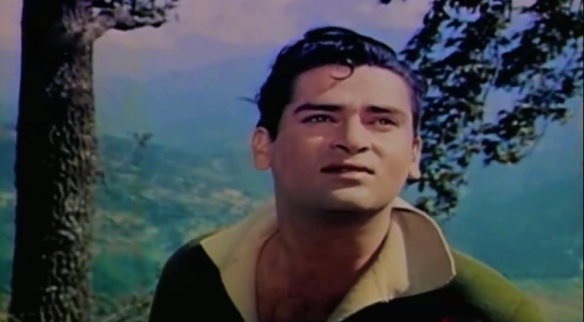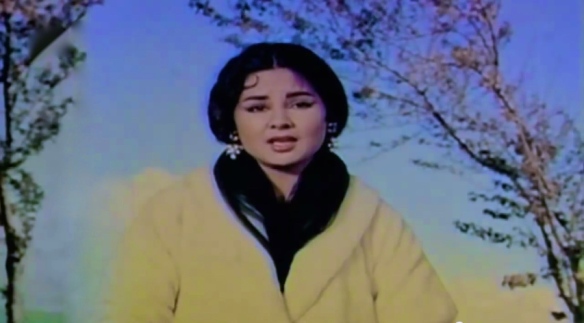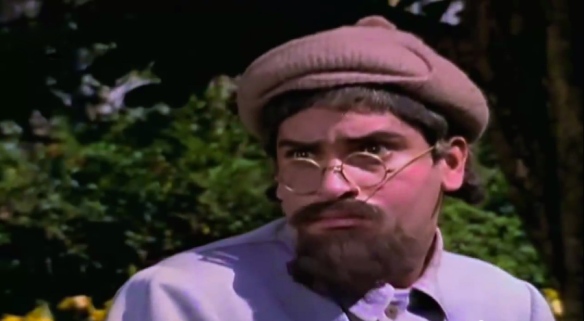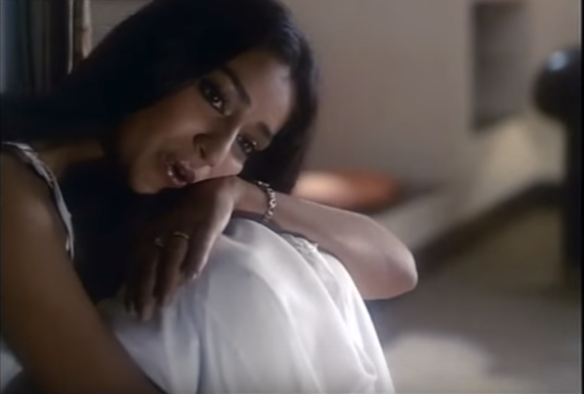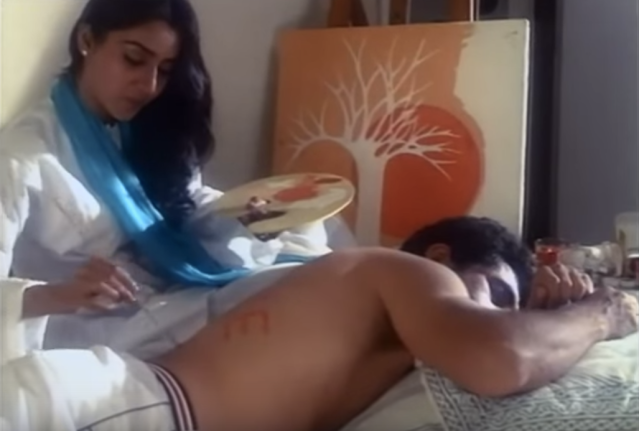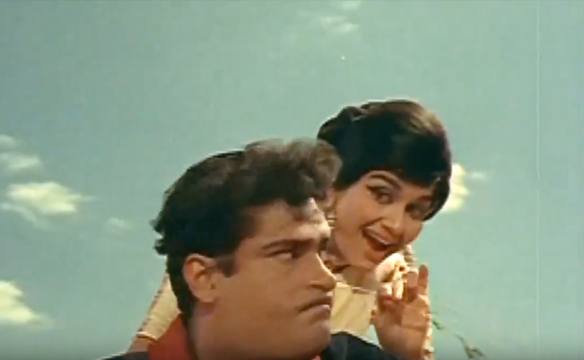
Asha Parekh flirts with Shammi Kapoor by poking hay in his ear during “O Mere Sona Re” from Teesri Manzil (1966).
Today we showcase the lyrics and English translation of “O Mere Sona Re” from the film Teesri Manzil (1966). This playful duet is one of many gems in R. D. Burman’s crowning soundtrack for this memorable film.
Teesri Manzil opens as a dark murder mystery when Asha Parekh’s sister falls to her death off the balcony of the third story of a hotel. Seeking revenge on her sister’s ex-lover Rocky whom she believes to be the culprit, Asha travels to Deradhun where Rocky is the lead singer in a band. However, she’s (almost literally) derailed by a train ride meet-cute with Shammi Kapoor, transforming the film into a slapstick romantic-comedy. Smooth operator Shammi Kapoor and corny, but savage Asha Parekh exchange a biting repartee that builds a perfect synergy between the two notoriously over-the-top actors.
After a misunderstanding about Shammi’s romantic, but honorable intentions, Asha leaves him in the lurch only for him to be beaten up by goons before her eyes–a consequence she deeply regrets. Asha cajoles him with the energetically flirtatious “O Mere Sona Re” on a sunny hillside. The song has particular significance in the film as she had hitherto refused to call him by his nickname “Sona.” Although she now uses this term of endearment for romantic effect, the joke is on her because the audience knows something he has been desperately hiding from her: Sona is actually Rocky!

Asha Parekh and Shammi Kapoor create Vaudevillian chemistry in Teesri Manzil (1966).
Can you hear that single-note high-pitched violin? It’s the sound of your interest being piqued. We hope that you love our English translation of the beloved “O Mere Sona Re” below–it’s one of the most fun Asha-Rafi duets from that era! And we both know you never hit “skip” when it pops up on your iTunes shuffle.
O Mere Sona Re Lyrics & Translation:
O mere sonaa re, sonaa re, sonaa re
Oh my beloved, my beloved, my beloved
de duu.Ngii jaa.N judaa mat honaa re
I will give you my life, but let us not be separated
mai.N ne tujhe zaraa der mei.N jaanaa
I took some time to get to you know better
huaa qusuur khafaa mat honaa re
It was my fault, but do not become upset
O mere sonaa re, sonaa re, sonaa …
Oh my beloved, my beloved, my beloved…
o merii baaho.N se nikal ke, tu agar mere raste se haT jayegaa
Oh if you escape from my arms and leave my path
toh laharaake ho balkhaake, meraa saayaa tere tan se lipaT jaayegaa
Then swaying and billowing, my shadow will wrap around your body
Tum chhuDaao laakh damaa.N
You may release yourself from a hundred thousand of my embraces
chhoDte hai.N kab yeh armaa.N?
But when will you let go of these desires?
Ki mai.N bhii saath rahuu.Ngii rahoge jahaa.N
For I will stay together with you wherever you are
O mere sonaa re, sonaa re, sonaa…
O miyaa, hamse na chhipaao, woh banaavaT kii saarii adaaye.N liye
O gentleman, do not hide from me with all your artificial graces
Ki tum is pe ho itaraate, ki mai.N piichhe huu.N sau iltijaae.N liye
Why must you flaunt so much when I am behind you pleading a hundred times?
jii, mai.N khush huu.N, mere sonaa
Yes, I am happy my beloved
jhuuTh hai kyaa? Sach kaho na!
Is this a lie? Tell me the truth!
Ki mai.N bhii saath rahuu.Ngii rahoge jahaa.N
For I will stay together with you wherever you are
O mere sonaa re sonaa re sonaa…
O phir hamse na ulajhnaa, nahii.N laT aur uljhan mei.N paD jayegii
Oh, do not entangle me again, for if not, your hair will become even more tangled
O pachtaaogii kuch aise, ki yeh surakhii labo.N kii utar jaayegii
Oh, you will regret so much that the redness of your lips will disappear
yeh sazaa tum bhuul na jaanaa
Do not forget this punishment
pyaar ko Thokar mat lagaanaa
Do not knock down love again
ki chalaa jaau.Ngaa phir mai.N na jaane kahaa.N
For I will leave then, I do not know where
O mere sonaa re sonaa re sonaa…
Glossary:
sonaa: beloved (literally: gold/golden one); jaan: life; judaa: separation; der mei.N: late; qusuur: fault; khafaa: angry; baahe.N: arms; nikalnaa: to come out, to emerge; raastaa: path; haT jaanaa: to get out; laharaanaa: to sway, to wave; balkhaanaa: to billow; saayaa: shadow; tan: body; lipaT jaanaa: to wrap around, to twist; chhudaanaa: to release, to disengage; laakh: one hundred thousand; daamaa.N: embrace; chhodnaa: to let go of, to release; armaa.N: desire; miyaa: gentleman; chhipaanaa: to hide; banaavaT: artificial, fake; adaa: grace, style; itaraanaa: to flaunt, to show off; piichhe: behind; iltajaa: plea; khush: happy; jhuuTh: lie; sach: truth; phir: again, then; ulajhnaa: to bother, to entangle; laT: locks of hair; pachtaanaa: to regret; surakhii: redness; lab: lips; utarnaa: to get off, to descend; sazaa: punishment; bhuulnaa: to forget; Thokar: knock;
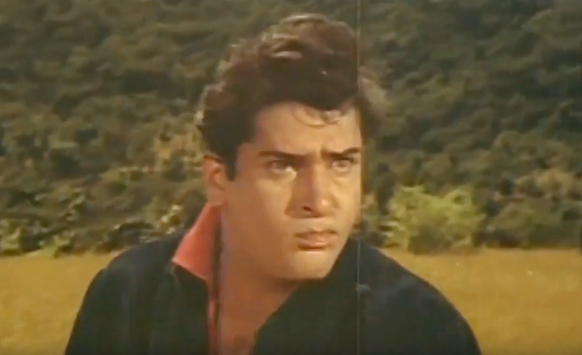
His pompadour ruffled irreparably, Shammi Kapoor reproaches Asha Parekh at the end of “O Mere Sona Re” from Teesri Manzil (1966).
You may now be asking yourself, what is poetic genius Majrooh Sultanpuri really saying on a deeper level with the whole “pachtaaogii kuch aise, ki yeh surakhii labo.N kii utar jaayegii“?
Like…are we just talking about lipstick getting smudged here…by her love interest perhaps? Or is she going to lose that red color because she grows pale from iron deficiency anemia? Will there be actual blood loss?
So many ways to interpret this. I leave it to you, O, gentle reader.
This winner was requested by superfan Shiraz. We love getting great requests like this one!
– Mrs. 55

